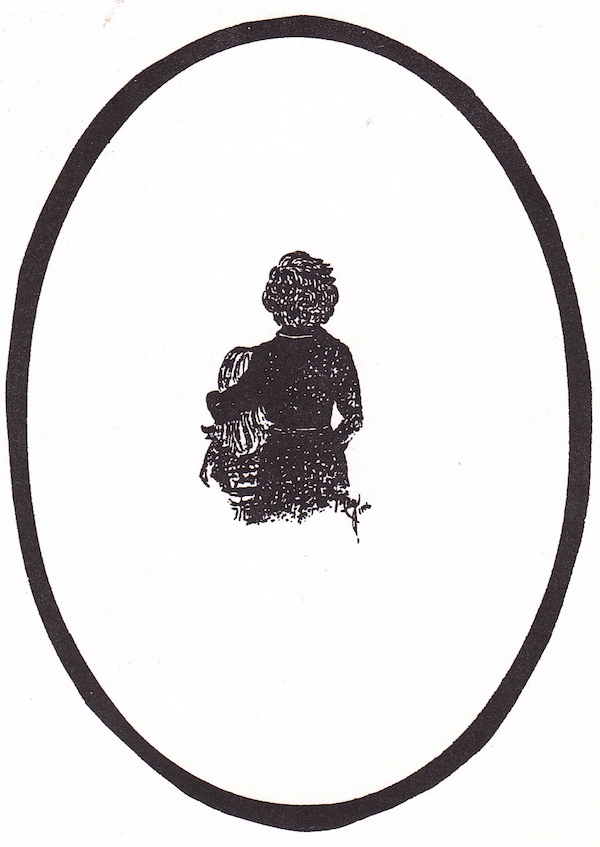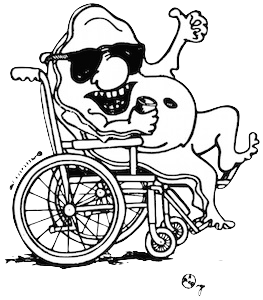
Meg Casey with mom
by Meg Casey
You've Got A Mouth – USE IT
Fitting in With Self Assurance
December 1 1982 (first weekly column)
Two of the questions asked of me and most often deal with self-confidence. First is "Meg, where does your obvious self assurance come from?" And the other is "Don't you ever feel self-conscious in public?"
My instant response is that I am a product of my environment. I come from a very large and proud Irish background. I was reared with a sense of pride in who I am and where I come from instilled in me and I'm honored to bear the family name.
While I sincerely mean the statement and it is all true, I suddenly remember a young a young girl of 11, then 16, then 18. I can now complete the original answer accurately … Practice!
Don't I ever feel self-conscious?
Of course I do! But after 27 years of practicing the act, the lines have become so second nature to me that even I forget that it wasn't always this easy.
I am not a natural. I am well studied.
I have come to realize the secret. The most important person to accept is you.
In order to do that you must be able to take a hard honest look at yourself. Examine at point blank range your physical appearance, as if you were a stranger.
Come to a decision if you don't agree with what you feel is the world's opinion of your value. Look closely at your own personality, both good and bad points. You are the only one who knows what's in your heart and mind. Keep what you like, change what you can and deal with the rest.
To be truthful with yourself is the hardest thing you'll ever do.
There's no feeling in the world that quite compares with the one that comes over you as every head turns and all conversation stops upon your entrance. No one alive is oblivious to that sort of drastic reaction. The dreaded "Pregnant Pause." It lasts only seconds (so they tell me) until mother's lessons of tact catches up to them like a poke in the ribs that hurts.
The trick is to appear unruffled by the experience and never let the stuff register on your face. The people who are with you will take their cue from your conduct.
Never remain frozen to the spot, continue to move to the center of the room, strutting a first class act and giving the presidential "genuine" smile all the way.
Heads are forced to turn your way. You are now in control and have become the center of attention on your own terms. You give them so many things to stare at once that they don't know where to begin.
Keep saying "I'm a damn wonderful person" to yourself if you feel shaky and march yourself over and sit down next to the person whose mouth is the widest and look him in the eye.
You can either embarrass him and make an enemy or you can wear an acknowledging grin at having won as you say in the friendliest voice you ever heard "Hi! How are you?" I recommend this tactic. There's nothing more obvious then a person trying not to notice.
Make a friend for life and impress everyone else in the room. The victory you'll have over your self-control will give you a high for a week. Bitterness only gives small scores and leaves you lonely.
Realize the reality that there isn't person on Earth that doesn't help know how self-consciousness feels. It is not an emotion unique to persons with disabilities; It is human nature.
Acceptability is what being a social creature is all about. That's why the designer clothing industry is so lucrative; everyone is "fitting in." (Excuse the pun).
Ignoring Bullies
April 11 1984
Dear Meg,
A friend at school is new this year and he really didn't fit in. One day one of the guys started picking on Bobby – I guess because he is kind of different. Bobby was cool about it and after a while it was no big deal that he was around with us.
Bobby has some kind of a learning disability and that is why he sometimes seems to be different. Once in a while other kids still try to bother him and only now he has friends to back him up if he ever needs help straightening them out.
Bobby is a pretty good kid to know. I figured if he could stick up for himself against everybody else making fun of him then I could admit that I like him and could show that I was really his friend without being afraid of what others say about it. That was hard to do but I'm glad that I did it because our friendship is a lot of fun and we have a lot in common.
Hello Readers,
Everyone alive relates to some degree or other with the pain and pressure of decisions we had to make and the treatment we received as a consequence of the accepted attitude of our peer groups. Throughout our lives we'll continue to feel it. Hopefully it becomes easy to withstand as we mature into adults.
As children it is the most difficult to understand. That is why these two boys' strength of character and determination to achieve self-respect at such a young age is impressive. Is very hard to stand alone – proudly. That is why it is so impressive to witness someone who is doing it well.
Public awareness, open discussions and integrated activities geared towards educating people about each other's lives will help to make mainstreaming attempts in our schools easier. The special education needs of our children can often open their vulnerable feelings up to harsh harassment by other children in their age. Children have no idea of the irreparable damage their teasing remarks can do to someone else's self image taken last them for the rest of his or her life.
Not everyone is tough enough to brave the battle. Battles of tears and insecurity, doubt and maybe loneliness are the hardest ones fought – usually with yourself – when safe at home and all alone in your room.
Here is an inside scoop for encouragement that not everyone knows about – Albert Einstein was nearly put out of school on several occasions because he was said to have a learning disability and acted different! It's true. Young Bobby is in good company! Good old Al certainly had the last laugh, didn't he?
Assertiveness Is An Art Form / The "Moron" Label
February 1 1984
1) Everyone treats me like a baby. Even some of the kids my own age bend down to me with their hands on their knees and talk to me like I am a 3 year old. Did you know how mad I get? I'm not 3, I am 14 years old! I am sick to death of being treated this way by grownups, teachers and kids. It's not my fault I'm handicapped.
2) Three years ago I injured my's spinal cord in an automobile accident and instantly joined the ranks of the wheelchair brigade, permanently. I was 18 then.
During these three years I had been rehabilitated physically, emotionally, vocationally and trained for my maximum independent living skill's potential. Supposedly, I am a ready-made packet for re-entry into society's mainstream. Supposedly… but I don't think that society is ready for me yet!
No one prepared me for dealing with the "Moron" label that seems to have been given to me along with the new wheels. People don't ever talk directly to me unless there seems to be no other option. They ask the person I am with what I would like, or if I'm having a good time, or look all around for my keeper if I appear before at them on my own.
I also don't have a speech problem. In fact it has often been commented that I have a very deep and clear voice and would make a great radio announcer, yet I've often had to repeat my words over and over to people who are waiting on me as if I spoke unintelligible garble.
Dear Readers:
The "Commonality Syndrome" in these situations should be obvious and I had hoped that putting them together made it even more obvious. Each of the those people are being victimized by typecasting and a pre-conceived ideas that society has fostered for centuries – ideas about how "those kinds" of people are supposed to act.
Of course life would be simply hunky-dory if everyone would just go about treating other individuals exactly as they would like to be dealt with themselves if the positions were reversed. However, this isn't the land of Oz so I don't suggest waiting for a wizard to pull an instant remedy out of his bag of tricks.
The solution to each person's from must come from within themselves and the strength of their desire to change things around them. It is perfectly alright to get angry, but don't stay that way. Yes, I know – exactly how maddening each of these treatments are because I have had to deal with each of them at one time or another. I can hear my mother's words echoing in my memory "Margaret Mary, you've got a mouth – USE IT! If you don't like something – Say so!" I was taught that a little body doesn't make a "little person." On the other hand a big mouth doesn't make a little person any bigger – or smarter, necessarily.
One must learn to be assertive for one's own self-respect and preservation. Assertiveness is really an art form to perfect, becoming either an obnoxious crank or the picture of popularity earning social respect through your independent personality and intelligence.
Patience must also be learned and I believe that this was the hardest of all virtues for me to practice. Good moods are not constant with anyone, in some days running ignorant people over with a wheelchair may sound like fun, but it will never pay off any positive benefits in the long run. So remember that, smile, and try a little reverse patronizing for a change.
Invisible Handicap
November 2 1983
Dear Meg,
I have an invisible handicap. The fear of rejection. This is most troublesome but especially when I go for a job interview. I am so filled with this fear of rejection that I can't project myself in a favorable manner. Before I go into an interview room, I know that the answer will be "we'll call you." I know this fear makes me look incapable of doing a good job. I am good at my work and can prove it once I get the chance.
I know that you are not afraid of rejection. What is your great secret?
From someone who is just plain afraid!
Dear J.P.A. (Just Plain Afraid);
Don't presume too much for my steely nerves buddy! Everyone has a fear of rejection as sometime or another. It just may be that some of us are better at hiding our shakiness under the guise of an overly cocky beast. My own technique is to smile harder, talk wittier (half witty) and sit still.
I have a hard time selling myself too, only I make jokes out of it and no one believes me, but I do. I could be physically ill sometimes for the worrying I've done over the impression I might have made on people. Somehow it has always worked out in the end. Not always without broken eggs in my basket and me with the telltale stains on my skirt but … so what. It is only a skirt and I can change it if I want to.
It may not work out to have been the way my plans were originally set up for either. I then fall back on my grandmother's expression for these types of situations. "What's to be, is to be – is to be. " Translation: if it was meant to be, it will. It is not, it won't. Relax and meditate on that a while.
If that doesn't help to calm you find reassurance in the knowledge that even famous actors and actresses and entertainers break out into a cold sweat and throw up in their dressing rooms before walking out on stage on opening night. And they know that their fans love them if they fall on their faces or not.
So you and I are in good company. Maybe there is a market not yet targeted by industry for us Champion Knee-Knockers?
You might also give serious consideration to taking a class for public speaking or trying one for acting. This is a really good way to learn to role play, and practice being someone else in your position.
Many invisible handicaps that limit a person's ability to navigate the world are often not picked up through an initial observation of physical characteristics. They can range from social ones that many "normal" people may have like shyness to mental and physical ones. Some people with mental quirks may be awkward socially but brilliant in other areas such as art or creative problem solving. In some instances deafness can affect one's equilibrium or balance and be mistaken for being drunk. That inability of many to tell the difference results in a change in attitude by the general public from sympathy for a person with a disability to disgust at someone to blame for their condition.



